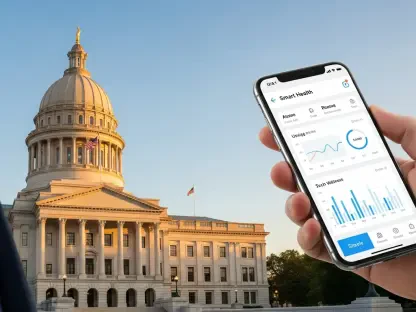Have you ever picked up your phone, expecting an important call, only to be greeted by a robotic voice trying to sell you something or, worse, scam you out of your savings? This frustrating scenario plays out millions of times daily across the United States, as nuisance robocalls have become a relentless plague on personal privacy and financial security. These automated intrusions disrupt lives, often targeting the vulnerable with deceptive tactics. What if a united front of state leaders, crossing party lines, could finally turn the tide against this epidemic? The story of bipartisan attorneys general stepping up offers a glimmer of hope in an otherwise aggravating battle.
The Scale of a National Annoyance
The significance of this issue cannot be overstated, as robocalls represent more than just a minor inconvenience—they are a pervasive threat affecting nearly every phone owner. According to recent data from the Federal Trade Commission, Americans received over 4 billion robocalls in a single month last year, a staggering volume that underscores the urgency for action. This crisis has propelled state attorneys general to prioritize consumer protection, setting aside political differences to address a problem that impacts constituents across the spectrum. Their collective effort signals a rare moment of unity in tackling a shared societal burden.
Evolution of a Digital Menace
Robocalls have transformed from simple telemarketing annoyances into sophisticated tools for fraud, often employing spoofed numbers to trick recipients into answering. Scammers behind these calls frequently pose as legitimate entities, such as government agencies or banks, to extract personal information or money. This evolution reflects broader challenges in digital communication, where technology outpaces regulation, leaving consumers exposed. The financial toll is immense, with losses to robocall scams estimated in the billions annually, making it a critical issue for state leaders to confront with coordinated strategies.
A Cross-Party Crusade for Relief
State attorneys general from both sides of the political aisle have formed an unprecedented coalition to combat this digital scourge, showcasing the power of bipartisan collaboration on consumer issues. Their initiatives include filing lawsuits against major robocall networks and forging partnerships with federal bodies like the Federal Communications Commission to enhance enforcement. For instance, recent joint actions have led to the shutdown of several large-scale operations, reducing call volumes in targeted regions by as much as 20% in some states. Such outcomes highlight the potential of unified legal pressure to disrupt scammers’ operations and protect the public.
Perspectives from the Front Lines
Insights from key figures in this fight add depth to the narrative of resistance against robocalls, illustrating both determination and urgency. A prominent state attorney general recently stated that protecting citizens from fraudulent calls transcends partisan politics, emphasizing the need for sustained cooperation. Consumer advocates also weigh in, noting that while legal actions are vital, public awareness remains a cornerstone of prevention. One victim’s story—a retiree who lost thousands to a scam call pretending to be from the IRS—brings home the human cost, reminding all stakeholders of the real lives at stake in this ongoing struggle.
Empowering Individuals Against Intrusion
While state leaders battle robocalls on a systemic level, individuals can take immediate steps to shield themselves from these unwanted calls. Registering a phone number with the National Do Not Call Registry offers a first line of defense against legitimate telemarketing, though it won’t stop scammers. Downloading call-blocking apps or utilizing carrier-provided tools can filter out many suspicious calls, providing an additional layer of protection. Above all, vigilance is key—never share personal details over the phone unless the caller’s identity is verified beyond doubt, as recognizing scam red flags can prevent significant loss.
Reflecting on Progress and Next Steps
Looking back, the bipartisan push by state attorneys general marked a pivotal moment in the fight against nuisance robocalls, demonstrating that unity could yield tangible results in consumer protection. Their lawsuits and partnerships with federal agencies laid a foundation for reducing call volumes and holding scammers accountable. Yet, the battle is far from over, as technology continues to evolve, demanding adaptive strategies. Moving forward, stronger regulations on telecom providers to implement advanced call authentication are seen as essential. Public education campaigns also emerged as a priority to equip citizens with the knowledge to fend off fraud. These steps, combined with ongoing legal efforts, offer a roadmap toward a future where phone calls no longer instill dread but restore trust in communication.









